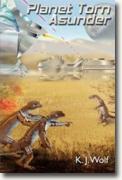Planet Torn Asunder
K.J. Wolf
book reviews:
· general fiction
· chick lit/romance
· sci-fi/fantasy
· graphic novels
· nonfiction
· audio books
· author interviews
· children's books @
curledupkids.com
· DVD reviews @
curledupdvd.com
newsletter
win books
buy online
links
home
for authors
& publishers
for reviewers

 |
Planet Torn Asunder K.J. Wolf Xlibris Paperback 284 pages November 2006 |
|
Why lizards?
So why are we reading about lizards? The answer is unclear. The Eastern continent, ruled by the Clonce family, is in crisis. The worst drought in history is raging, and the ruler decides to negotiate peace with the ruling family of the West, the Voshiaddas. The Clonce prince, heir to the throne, feels this would deprive his nation of any autonomy and pride. So he kills his parents, frames the Voshiaddas, and starts a rebellion that leads to total war, forcing the Western Lizzardi to abandon their planet. What follows is an all-too-familiar story of lust for power, the grueling responsibilities of leadership, and several coming-of-age narratives. The book ends just after the final climax of the story so far, suggesting either a sequel or just a tale that feels incomplete. Unfortunately, “why” was a question that kept coming up in all the wrong places. As it turns out, Wolf has difficulty managing his universe, failing to make it credible or compelling. The novel provides little in the way of justification. It is apparent that the East and West have cultural differences more or less congruous with America and the USSR in the Cold War, but there is no real history as to why they are in conflict. The planet has a guardian god, placed there by Time itself, but we are left in the dark as to what his purpose is and how he functions in relation to Lizzardi society. The absence of any religious structure (besides saying “may Boelijianie be with you”) is an interesting choice, but needs explaining, as empirical evidence of a deity would make a real faith structure more probable. And when the god creates the sonta Boe, a Lizzardi endowed with magic powers to guide the whole race, why is this not a bigger deal for the rest of the lizards? What are we to make of the Huminids on the planet Solarzem? Does their name signify they are our ancestors? If so, why are they psychic? If not, why name them something that obvious? These are a small fraction of unanswered questions and loose ends left by Wolf in establishing his universe. It appears that in an effort to keep the narrative taut and to the plot, he has neglected almost all the exposition needed to make the reader understand his world. He also fails to give the reader a reason to care about this universe, to find its characters identifiable, its society interesting, or its ideas worth thinking about. When seeing a book about a species of lizards at war, I requested a review copy expecting some analysis of conflict from a completely non-human source, à la Turtledove’s novels with the Race (a species of lizards with a society vastly different from ours, which provides the components for an idea-rich plot). Instead, Wolf has crafted men in scales, a typical satirical route to show our flaws through a different skin. Even then, he has to account for issues like why the lizards have close relationships with their young and live as monogamous mammals. If they are so mammalian, either explain it or make them mammals. The character development is also too breezy. While he does a good job at mixing character building and plot, the main characters are too archetypical to be cared about. The coming-of-age stories are bland, and only brief fragments of personality are there for the rest of the cast. The result of this lack of ideas and banal storytelling is a skeleton novel with mismatched areas of meat. Fortunately, Wolf’s plot does drive the story forward so it never feels stalled, but that is not enough to account for the emptiness of the narrative. There is earnestness in the writing; it feels like a rough first draft to set the spine of the novel, awaiting the careful layering that comes with rewriting and editing. The good influences are also there: the people forced to flee its home is classic Battlestar Galactica, the mystical swords and guardian gods feel very The Lord of the Rings; they just need to be less obvious to allow the story to shine on its own. As a beach read it suffices—the action makes for passable television, and the story is not so ridiculous as to be rendered unreadable. But this is not lasting science fiction. In a genre where good writing is often secondary to interesting ideas and creative thinking, real innovative writing need not be the best craft, but it ought to provide something new. Planet Torn Asunder Originally published on Curled Up With A Good Book at www.curledup.com. © Max Falkowitz, 2007 |
|
|
|
 Click here to learn more about this month's sponsor! |
|
| fiction · sf/f · comic books · nonfiction · audio newsletter · free book contest · buy books online review index · links · · authors & publishers reviewers |
|
| site by ELBO Computing Resources, Inc. | |
